
by
Paul Broussard
, posted 2 hours ago / 281 Views
If modern AAA gaming is anything to go by, the popular design philosophy of the day is to build huge worlds or universes and then not have nearly enough meaningful content to fill them. The end results of this seemingly never-ending competition for who can create the “biggest” game are titles that feel either very repetitive or utterly lifeless – and sometimes both. Perhaps that’s why I have such a soft spot for the Like a Dragon series; despite whatever long-standing issues I may have with these games, they’ve always taken the inverse approach to that design philosophy. Like a Dragon games stuff their relatively small maps with so much content that they’re bursting at the seams.
So after a year filled with lots of barren and/or repetitive-feeling releases, which will remain nameless to avoid controversy, I was looking forward to a welcome reprieve with the latest Like a Dragon release: Infinite Wealth.
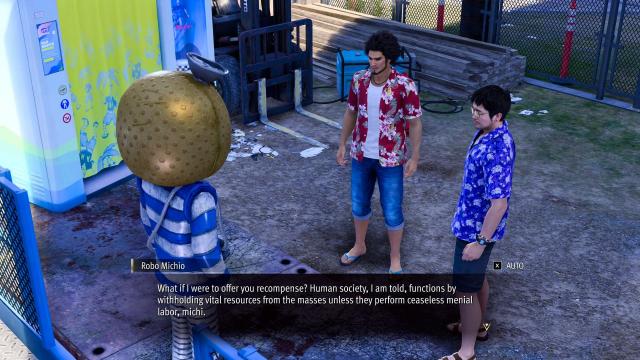
Infinite Wealth picks up a few years after the events of Yakuza: Like a Dragon, in which new series protagonist and resident loveable dumbass Ichiban Kasuga lost his father while saving Japan from his father’s adopted son/sorta kinda surrogate brother. Upon hearing that his mother might be alive, Ichiban tries to avoid a full strike out on the dead family members card and heads to Hawaii in search of her. Meanwhile, in the four years since Like a Dragon Gaiden: The Man Who Erased His Name, Kazuma Kiryu has somehow managed to acquire an entirely new backstory, in which he got terminal cancer while working at a toxic waste dump (yeah, it definitely wasn’t from being a chain smoker for 30 years, Kiryu). The two meet during a chance encounter in Hawaii, and, after the usual Like a Dragon shenanigans that result in picking up some new party members, they set out to find Ichiban’s mother.
The story as a whole is what we’ve come to expect from the series: it’s delightfully absurd most of the time, while it simultaneously manages to pull itself together and be genuinely serious & impactful when it wants to. A lot of this comes down to Ichiban and Kiryu, as Infinite Wealth’s plot is probably the one most driven by its main characters in the entire series.
Ichiban’s side of the story has him frequently wrestling with who he is and, perhaps more importantly, who he isn’t. It’s almost a coming of age story, or at least, as much of a coming of age story as you can have for a guy in his late 40s, and his infectious optimism carries the dialogue and the moment-to-moment developments throughout. If the series is moving on from Kiryu after this, it’s hard to imagine a more ideal candidate than Ichiban to take over: he encapsulates the humanity that’s made past protagonists enjoyable, yet still maintains his own unique and colorful personality.
Speaking of Kiryu, though, his portion is a sadder affair, as he has to confront his mortality after nearly two real world and four in-game decades of stomping people’s faces in with impunity. While I’ve continually held reservations about these titles undoing the ending of Yakuza 6 by bringing Kiryu out of retirement, Infinite Wealth probably makes the strongest case yet that it was worthwhile by giving him a final farewell tour. His narrative here is very much one crafted for fans, with the time in-between major story events being broken up by revisiting locations and characters from older titles, and hearing Kiryu’s thoughts and reflections on everything he’s done with his life. If you’re a relative newcomer to the series, I have to imagine this might just feel like the developers padding the runtime out, but as someone who has been playing these titles since the start, this impromptu farewell tour really hit me. It felt like spending one last night out on the town before saying goodbye to an old friend, revisiting old stomping grounds and having a final adventure. Although, having said that, I reserve the right to come back to this review and cut its score in half if they decide to bring Kiryu back yet again and undo another game’s “final” ending for him.
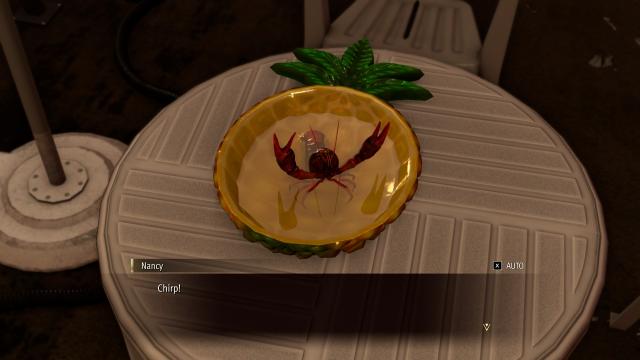
The rest of the cast also gets a good deal of development too. Series newcomers Towizama and Chitose both have compelling arcs that bleed over heavily into the main story, and several people from the Infinite Wealth’s predecessor are back too. The various drink conversations from Yakuza: Like a Dragon return, but are integrated with a new bond system that ties them to combat bonuses. Overall, Infinite Wealth does a good job fleshing out its characters, and while the two main leads (rightfully) get the lion’s share of the work, the rest of the cast has a good bit of effort sunk into them as well.
And it’s a good thing that the playable characters are so well-developed, because everyone outside of them… isn’t. Much of the game’s plot revolves around yet another “save the innocent girl from the big baddies” quest, but unlike Yakuza 0, 1, and 6, where we actually got to know said girl and, perhaps more importantly, the people who were trying to harm her, we barely spend any time around them in Infinite Wealth. We don’t even get to meet said girl until about 70% of the way through the story, and she spends pretty much the entire game after that either getting kidnapped again or hiding in a closet while we sort out the adult stuff. And the principal antagonist for much of the plot is even more closed off: he shows up a grand total of twice before the final fight, which is insane logic for a Like a Dragon title.
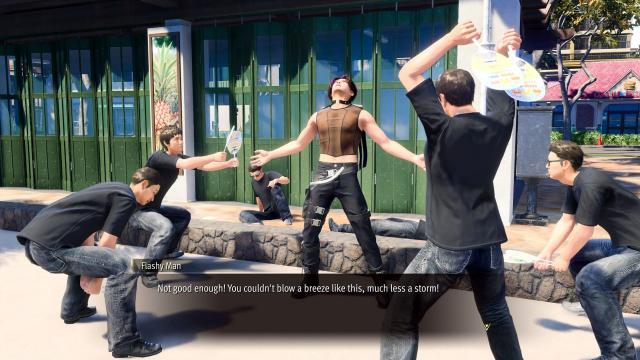
Some other significant plot threads also just don’t get anywhere close to enough resolution given their build up. I’ll be throwing out some minor spoilers here, so skip to the next paragraph if you want to avoid any details, but I’ll try and keep things pretty ambiguous if you want to read on. Some ways into the game, the party decides to try and recruit some characters to assist them with their cause. This results in a long series of cutscenes with a party member and said characters discussing their ideological differences, and eventually a full blown boss fight when they get upset with each other. The resolution to this whole plot point is said characters eventually showing up at the very end to hold off some enemies and then we never hear or see from them again.
Fortunately just about every character is supported by the strong cast of voice actors. Kaiji Tang reprises his role as Ichiban and does an exceptional job here, as does virtually everyone who voiced a playable character in Yakuza: Like a Dragon. Matthew Yang King and Suzie Yeung round out the new characters with solid performances as well, leaving only… Kazuma Kiryu, unfortunately. This is the dub’s only real stumble, and it’s unfortunate, because he’s such an important character. Gaming YouTuber YongYea was brought in to voice Kiryu and he just doesn’t fit a nearly 60 year old veteran of countless battles. To his credit, I don’t really think this is YongYea’s fault; it was just a bad miscast. He sounds like a young guy pretending to be old on a zoom call, and it really doesn’t work. Unfortunately it goes from subpar to awful during the karaoke minigames because of some horrific autotuning.
One last point of praise for the story is the moment-to-moment writing, which is brutally funny. Perhaps this is just due to me being an American and recognizing more of the references, because the game is set mostly in Hawaii, but the social commentary here is actually really funny and relevant. Infinite Wealth speaks on everything from corrupt police, to America’s gun culture, to poverty, and while it’s rarely particularly deep, it’s the kind of unpredictable writing that you can’t help but both laugh at and be hurt by. It’s a rare quality in games, and something I hope the series does more of (or, at least, perhaps more that I can recognize).
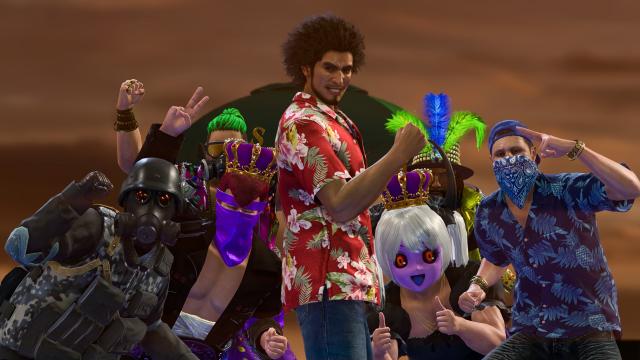
Of course, we’re here for the gameplay as well, and that remains largely preserved from Yakuza: Like a Dragon, albeit with a healthy smattering of improvements. Combat is the primary focal point of the gameplay, and Infinite Wealth has made it even more over-the-top than it was in its predecessor. You’re still working with a turn-based combat system that’s “balanced” about as much as the Treaty of Versailles was, a series of increasingly wacky jobs that lend themselves to different skills, and a selection of moves that range from utterly useless to so completely broken that the game is basically over as soon as you discover them.
There are several quality-of-life improvements that I’m very grateful for though: the ability to maneuver characters around the battlefield manually is a welcome addition that means the returning follow-up attack system has an element of strategy to it; all skills are now inheritable across jobs, rather than there being just two specific ones per job; and the summon system from the last game (Poundmates), is much more useful, with attack damage now more befitting the cost.
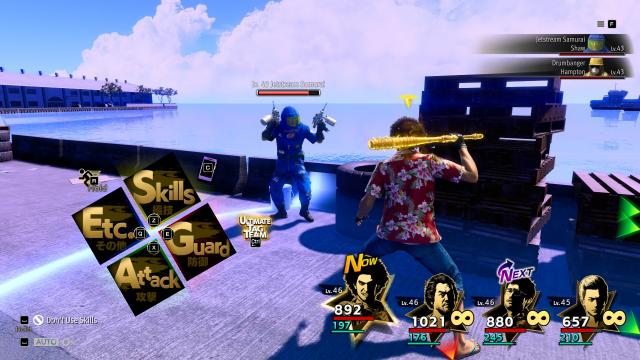
The problem is the balance. All of the aforementioned improvements create a system that’s arguably even more broken than it was in the last entry, and the fact that some of the most overpowered attacks in the game can now be inherited by anyone (rather than just being limited to Joongi Han) means that it’s very easy to create a team of absolute monsters that demolish basically anything. The only times I died were when the game sprung much higher level enemies on me at the end of side quests that I took on too early. While JRPGs are no stranger to the concept of broken builds, it’s hard for me to think of one that takes less effort to reach that point than Infinite Wealth.
Still though, a balanced combat experience has probably never been the point of Like a Dragon titles, even when they use brawler mechanics. The point has been making systems that are fun to interact with, and Infinite Wealth certainly still does that. Experimenting with different ways to demolish various groups of enemies remains entertaining throughout, as does just fully embracing the sheer silliness of things and launching a lobster/hermit crab duo to poison a crowd of enemies before unleashing a bucket of champagne to chill them out. It still very much possesses that all-important charm of past entries, and for a series that has relied more on the experience of creating a power trip than a deep, technical system, it’s not the biggest issue in the world.
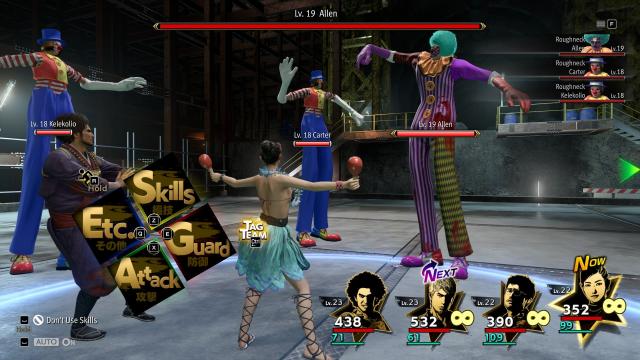
Beyond combat, there’s the usual suite of side activities. While many are carryovers from prior entries, like the vocational testing school, can collection, darts, shogi, and so on, there are also quite a few new ones. There’s a DoorDash-esque game involving riding a bike to pick up food and drop it off to customers, a dating app minigame that’s frankly just bizarre, and an experience reminiscent of Pokemon Snap, where you ride on a trolley and take pictures of “sickos.” But the biggest two experiences are full blown Pokemon and Animal Crossing spoofs. The former, which is an extension of the Sujimon quest from Yakuza: Like a Dragon, involves creating teams of enemies you recruit from regular battles throughout the world to fight in 6v6 matches. It has its own series of type matchups, gyms, badges, and an entirely different battle system. The latter, called Dondonko Island, involves building your own vacation home on a distant island, slowly clearing out piles of trash and developing structures to attract customers. It’s pretty easy to sink hours upon hours into constructing your ideal vacation home.
It’s a good suite of side activities, but I would argue that it doesn’t quite reach the heights of the series for me. As entertaining as the Sujimon and Dondonko Island quests can be, it becomes readily apparent that they’re fairly shallow compared to Yakuza 7’s business management or 0’s cabaret management. The Sujimon game is pretty much over as soon as you realize that you can just assemble a team of people with huge speed stats to maximize the number of attacks you can perform. And for Dondonko Island, you can abuse the natural landscape, filling it with as many money-making opportunities as possible to maximize profit and customer happiness, so that you can get higher ranks and make even more money. It’s not that the experiences are bad, but I didn’t find myself becoming obsessed with them as I have previous Like a Dragon side content.
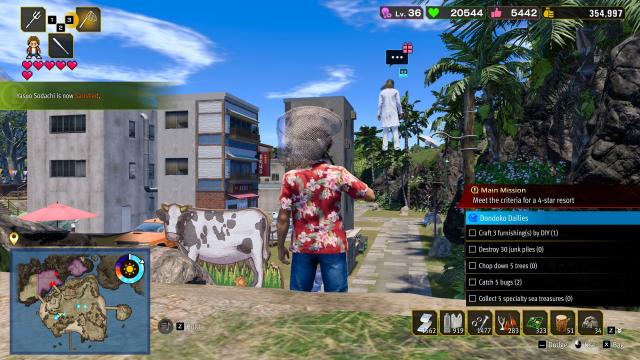
The qualifiers I’ve put on the gameplay and story so far certainly don’t apply to the music. The soundtrack is absolutely sublime and one of the best in the series, featuring some incredibly catchy tunes for everything from boss battles all the way down to the job changing station. There are even some fantastic callback tunes to previous parts of the series, which I won’t spoil, but they really hammer home the “one last ride” feeling for Kiryu.
Another unabashed area of praise are the various other quality-of-life improvements. There’s a new feature that allows you to just instantly win fights against significantly weaker foes at the cost of reducing some of the XP gained, which means it never feels like you’re getting held up by pointless battles. A few slightly more subdued improvements include: a creatable playlist to listen to while roaming around; the inclusion of a Segway, which can be used to move around more quickly than walking; and regaining MP from basic melee attacks, which means they offer some more utility in combat.
On the flipside, one additional point of criticism that I would be remiss not to mention is the locking of New Game Plus behind a paywall, requiring either the purchase of DLC or one of the special additions. Given the sheer amount of content in Infinite Wealth, this seems like a particular sticking point, as any repeat playthroughs will require redoing a ton of the same stuff over again. It’s hard to frame this as anything other than an immensely greedy cash grab from Sega, and one that I’m pretty disappointed by.
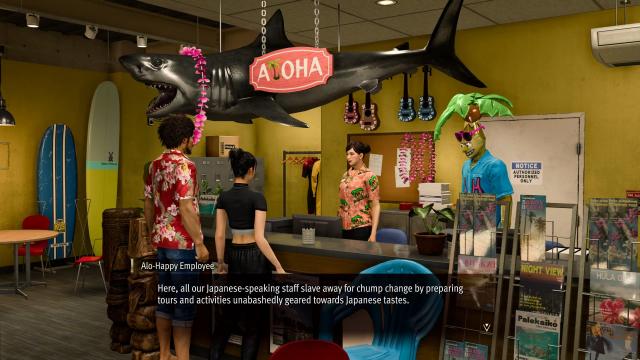
Ultimately, despite the smattering of improvements made, I do come away feeling like I enjoyed Infinite Wealth less than Yakuza: Like a Dragon. Don’t get me wrong, that’s not an indictment of the game; Infinite Wealth is very much a great experience. It has a ton of excellent content, character development, and just plain charm. Having said that, Like a Dragon titles are experiential games above all else, and that means the best entries are those that keep presenting new and exciting experiences until the very end. Yakuza: Like a Dragon was such a unique experience for me because everything it did felt fresh and new, while nearly everything done here feels… well, redone, even if it is still fun and comes with a fresh coat of paint.
To try and distil those feelings into an example: the reward for beating the largest minigame in Yakuza: Like a Dragon is a new attack to throw into your repertoire. It consists of a giant orbital laser that nukes enemies and feels straight out of the plot of Tekken 7. It’s such a ridiculous, over-the-top addition, with nothing like it in the series before. In Infinite Wealth, the reward for beating the largest minigame is…another giant orbital laser, except some friends from the Animal Crossing minigame jump over your shoulder. Outside of that, the animation, MP cost, and functionality of the attack are all exactly the same. It’s still definitely fun to wipe out a squad of baddies with a giant space laser, but it doesn’t have the same impact as it did the first time around. Infinite Wealth is that space laser. It takes and reuses a lot of ideas from Yakuza: Like a Dragon (and other titles), and they’re still fun to see and use, but they don’t quite capture the same feeling of never knowing what’s around the next corner, which is what made Yakuza: Like a Dragon so exceptional.
This review is based on a digital copy of Like a Dragon: Infinite Wealth for the PC
More Articles